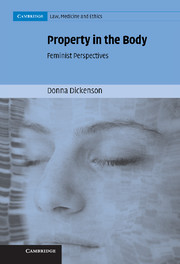Book contents
- Frontmatter
- Contents
- Acknowledgements
- Preface
- 1 Do We All Have ‘Feminised’ Bodies Now?
- 2 Property, Objectification and Commodification
- 3 The Lady Vanishes: What's Missing from the Stem Cell Debate
- 4 Umbilical Cord Blood Banks: Seizing Surplus Value
- 5 The Gender Politics of Genetic Patenting
- 6 Biobanks: Consent, Commercialisation and Charitable Trusts
- 7 The New French Resistance: Commodification Rejected?
- 8 Tonga, the Genetic Commons and No Man's Land
- 9 Afterword
- Bibliography
- Index
6 - Biobanks: Consent, Commercialisation and Charitable Trusts
Published online by Cambridge University Press: 15 December 2009
- Frontmatter
- Contents
- Acknowledgements
- Preface
- 1 Do We All Have ‘Feminised’ Bodies Now?
- 2 Property, Objectification and Commodification
- 3 The Lady Vanishes: What's Missing from the Stem Cell Debate
- 4 Umbilical Cord Blood Banks: Seizing Surplus Value
- 5 The Gender Politics of Genetic Patenting
- 6 Biobanks: Consent, Commercialisation and Charitable Trusts
- 7 The New French Resistance: Commodification Rejected?
- 8 Tonga, the Genetic Commons and No Man's Land
- 9 Afterword
- Bibliography
- Index
Summary
If genetic patenting evokes widespread fear that all bodies are being reduced to objectified female status, biobanks provoke an even more elemental fear of feminisation. When DNA or tissue is taken without consent, it might be thought that a sort of rape is taking place. What makes the parallel plausible is that this kind of taking is widely perceived not merely as a form of theft or assault, but also as a case in which consent to the assault is presumed. All bodies are frequently assumed to be open and accessible in biobanking, just as women's bodies are, in a society where the rape conviction rate has now dropped well below 10 per cent. More than nine times out of ten, police, prosecutors and juries don't believe the woman said no; they presume she really did consent. Similarly, the offence of marital rape was non-existent in the English common law until 1991; a wife's consent was simply presumed, with her body open and accessible. The original common law doctrine, enunciated by Chief Justice Matthew Hale in the seventeenth century, was that by accepting the so-called marriage ‘contract’, the woman ‘hath given up her body to her husband’ ‘which she cannot retract’. A similar phenomenon applies in biobanking, when citizens' consent is presumed by virtue of their having accepted the social rather than the sexual contract.
The prime example of presumed consent in biobanking was the original version of the Icelandic genomic database.
- Type
- Chapter
- Information
- Property in the BodyFeminist Perspectives, pp. 125 - 140Publisher: Cambridge University PressPrint publication year: 2007



